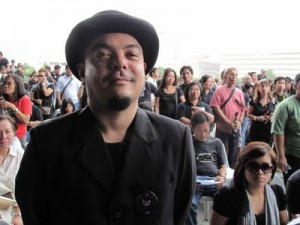 Here in the Philippines, the Catholic Church considers civil disobedience an option in its conflict with the government on the use of artificial contraceptives:
Here in the Philippines, the Catholic Church considers civil disobedience an option in its conflict with the government on the use of artificial contraceptives:
I don’t know if the Catholic Church is aware of this, but they too are very vulnerable to civil disobedience. Just less than a week ago, Carlos Celdran, a Manila tour guide by profession protested inside the church with what may also be considered civil disobedience:
“Ninety percent of the people want the RH (reproductive health) bill,” Celdran said.
Carlos Celdran was then promptly arrested, but later released on bail. People were divided, some praised him, and some didn’t. While some people agreed with his message to stop meddling in politics, some of the same people felt that the means by which he did it was in bad taste. He had also violated a law.
But now back to civil disobedience:
Civil disobedience is the active refusal to obey certain laws, demands, and commands of a government, or of an occupying international power. Civil disobedience is usually, but not always, defined as being nonviolent resistance. In its most nonviolent form (in India, known as ahimsaorsatyagraha) it could be said that it is compassion in the form of respectful disagreement.
I personally don’t agree with the manner by which Carlos Celdran expressed his message. But I couldn’t help but wonder, could his manner of expression also be considered ‘civil disobedience’? The very same kind of civil disobedience which the Catholic Church considers a ‘moral option’? And look again at the first quotation. It also stated, “The bishops said they had the moral authority.”
Moral authority? After the Pope has apologized for sexual harassment? Haven’t they heard of the verse in the bible ‘Ye shall know them by their fruits.”
Even assuming that civil disobedience is not done on the Catholic Church, it is still vulnerable to other events which may still be legal.
Is walking out of Sunday Mass illegal? I know of someone who walks out of Mass when she doesn’t agree with what the priest says. Currently, there are a number of issues right now which some churchgoers may not like, some may even consider them offensive. Carlos Celdran disagreed with the supposed meddling of the Church in political affairs. The political affair in question was the ‘RH bill’.
There are of course other things which ‘decent Catholics’ are not supposed to do, or they risk going to hell. These are all potential hot spots which can trigger walk outs.
We were also just talking about unpremeditated walk-outs, now how about premeditated walk-outs. Premeditated walk-outs are just like premeditated rallies. What if a group of 50 decides to attend mass, but later agree to all walk out at the same time when a certain issue like the ‘RH bill’ is mentioned by the officiating priest, is this illegal? As far as the attendees are concerned they are still Catholics, they were born Catholics even though they don’t go to mass, so who should prevent them from attending mass?


I disagree with your above mentioned statement that you don't agree with Celdran's method of protest. I completely agree with his action because the CBCP and their cohorts will never listen, he achieves a lot of impact, and you cannot respect an institution that has stopped thinking. The greatest movements and change in the world were done not thru blogs, letters and dialogue.